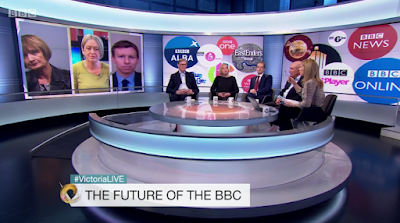The Victoria Derbyshire show had a discussion on 'The Future of the BBC' this week. The assembled guests ranged from a viewer called Victoria (who "supports and loves the BBC") through to Ryan Bourne of the IEA (who wants to privatise the IEA). Tessa Jowell and Bill Cash were also on, along with former BBC/ITV executive Roger Laughton and pro-BBC writer Gail Renard.
The discussion was a bit Tessa Jowell-heavy (she got more than four times as long as Ryan Bourne, for example, and nearly twice as long as Bill Cash) and Ryan Bourne only got one bite of the cherry whereas everyone else got two, three or four goes, but it was interesting nonetheless.
The bit that surprised me, however, was Bill Cash's comments about BBC bias - especially over the the BBC's EU referendum:
Could I really come back to this question of the use to which the money is made (sic)? Because 'educate, inform, entertain'...
Now as I understand it, and I've pressed very hard for this in papers I've written or in consultation exercises, that impartiality should be made one of the main principles of the BBC, because actually that's where the money, as it were, certainly in terms of the content of information and current affairs, etc. certainly comes home to roost.
The real question is: Do people really get the proper opportunity to hear both sides of the argument in a fair way?
And actually, in fairness, I will say the BBC has improved, over this EU referendum. I'm very glad to say that I who've been very critical, my European committee was very concerned, we have noticed a very significant change. It may not be perfect but it's certainly a great improvement.
But this is central to the information because it goes straight into people's drawing rooms. That is where you influence people. It's not just some people sitting around, like we are here, chatting. We're going into people's drawing rooms. It's effecting what they think. And it's very important that it be done impartially.
Does it seem to you, in your drawing room, that the BBC has 'greatly improved' as regards impartiality over the EU referendum debate?

Not one bit. After a brief flash of impartiality - a Question Time with both balanced panel and audience it's been pro-Remain propaganda all the way. Probably the worst example was Obama's visitation when the BBC dropped its standard Americophobic reporting style (normal service to be resumed soon, we expect) and boosted his threats for all they were worth.
ReplyDeleteThe bias comes in many forms:
1. Issue choice. Generally Remain-driven issues get more focus.
2. Prominence bias. Remain issues and statements tend to get a lot more headline treatment.
3. Content bias. A lot of the reporting simply follows the Remain line. If the IMF says there is a risk, this becomes an objectively verified risk in the words of the BBC reporter.
4. Time bias. Leave statements and interviews are given less time.
5. Interview bias. Leave spokespeople are subject to more interruption, and less open, more challenging questions.
6. Authority bias. People, often academics, with established pro-EU views often from EU-funded agencies are presented as authoritative and objective commentators and allowed to sum up the Remain and Leave cases - inevitably favouring Remain when they do.
7. Misrepresentation. I am finding that the Leave cases is very often either implicitly or explicitly misrepresented, with false oppositions being set up. This is often the case with migration where the Leave case is often misrepresented as wishing to stop all immigration, rather than bring in a sensible, controlled and coherent migration policy. The Remain position is never misrepresented as wanting to put no limit on migration. Another example is that the impression is given that Britain will be without trade agreements if it leaves the EU, but in fact it is an independent member of the WTO and so its trade agreements with the rest of the world remain in place.